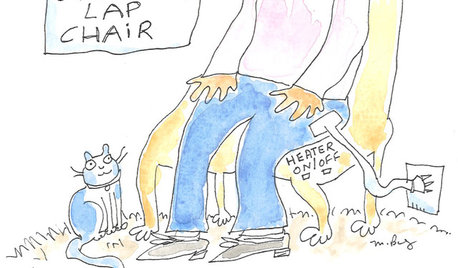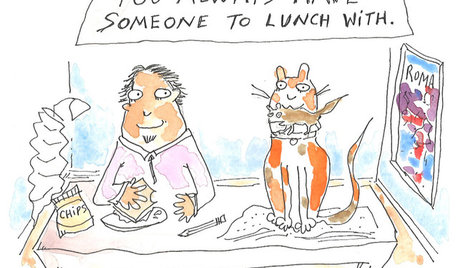Rabid Indoor Cat
jessicaml
11 years ago
Related Stories

PETS10 Tips for Keeping Indoor Cats Healthy and Happy
It's National Cat Day: Ask not what your cat can do for you (because it will ignore you) but what you can do for your cat
Full Story
PETSSo You Want to Get a Cat
If you're a cat lover, the joys outweigh any other issue. If you haven't lived with one yet, here are a few things to know
Full Story
FUN HOUZZIf Cats Could Design
Ever wonder what your cat might dream up as an architect or interior designer? Here's a peek
Full Story
PETSHouzz Call: Send in the Design Cats
Post your best photo of your cat at home, in the garden or with you in your studio. It could be published in a featured ideabook
Full Story
FUN HOUZZ6 Reasons Every House Needs a Cat
Everyone should have a feline fixture as part of their home decor. Here's why
Full Story
SHOP HOUZZHouzz Products: Create a Cat Heaven at Home
Show kitty you care and keep your style too with fun and cozy cat beds, perches, trees and decor
Full Story
THE HARDWORKING HOMEA Laundry Makes Room for a Diva Cat
A South Carolina laundry room was designed to be sophisticated and functional, but when a kitten arrived, whimsy emerged
Full Story
PETSHouzz Pets Survey: Who Rules the House — Dogs or Cats?
New data shows that pets make people happy, and pet owners love spending big to return the favor
Full Story
FUN HOUZZGeek Lab: How to Build a Steampunk Cat Transit System
Give your kitty another avenue for fun with a tubular walkway system that lets him go his own way
Full Story
PETSHouzz TV: Watch These Rescued Cats Make a House Their Playland
Spirals, catwalks, tunnels and platforms create a superhighway inside this home in Southern California
Full StorySponsored
Zanesville's Most Skilled & Knowledgeable Home Improvement Specialists







User
camlan
Related Discussions
Those of you with indoor cat.....
Q
Do storms affect your indoor cat?
Q
Possible Rabid Raccoon
Q
Citrus trees indoors with Cats?
Q
lkplatow
gsciencechick
work_in_progress_08
neetsiepie
gsciencechick
liriodendron
liriodendron
cyn427 (z. 7, N. VA)
camlan
cyn427 (z. 7, N. VA)
liriodendron
liriodendron
meigzilla
sweeby
camlan
work_in_progress_08
jessicamlOriginal Author
sweeby
camlan
kristine_ca